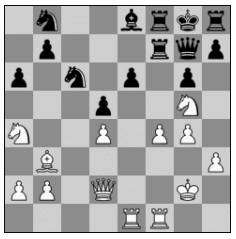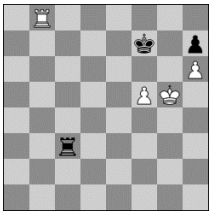This was a game from the final round of the US Amateur East. My team (What Does the GM say?) was facing off against defending champs Princeton A. We were the only 5-0s at this point, but Princeton had incredible tiebreaks, so we knew we needed a win. Princeton had slight rating edges on Boards 1-3, and we had a larger rating edge on Board 4. On Board 2, I had white against Andrew Ng, a strong master.
Grant Xu 2288
Andrew Ng 2341
U.S. Amateur Team East 2014
Sicilian, Alapin [B22]
1. e4 c5 2. d4
I had done some quick prep against Andrew before the game, and decided to have some fun with the Smith-Morra. I was nearly certain what he would play.
2… cxd4 3. c3 Nf6
Weak. Fortune favors the bold! Best was dxc3!
4. e5 Nd5 5. Nf3 Nc6 6. Bc4 Nb6 7. Bb3 g6 8. cxd4!?
I was expecting d6 or d5 instead. Now, I make the most natural move: recapture the pawn. But Esserman recommends Ng5! A sample line: 8. Ng5 Nxe5 (8... d6 9.exd6 e6 10. Qf3 Ne5 11. Qg3 Bxd6 12. Ne4 and Black's kingside dark squares look appetizing) 9. Qxd4 Bg7 10. Bxf7+ Kf8 11. Ne6+ +-
8... Bg7 9. Bf4 d5 10. h3 O-O 11. Nc3 a6 12. O-O e6?
A positional error. Black locks in his light-squared bishop, and seriously compromises the dark squares around his king. Now he is forced into the wrong side of a torturous grind. 12... Bf5 13. Rc1 Rc8 14. Re1 h6 15. g4 Be6 16. a3 Qd7 17. Ba2 and black has a solid position
13. Qc1 Bd7 14. Bg5
14. Bh6 f6 15. Bxg7 Kxg7 16. exf6+ Qxf6 17. Qe3 transposes to the game
14... f6? 15. exf6 Bxf6 16. Bxf6 Qxf6 17. Qe3
This just looks like a bad French. The d7 bishop is terrible, and there's the wonderful square on e5.
17… Rf7 18. Ne2
The immediate Ne5 isn't best: With Ne2, another knight goes to an outpost on d4 after its companion gets traded on e5, e.g. 18. Ne5 Nxe5 19. dxe5 Qd8
18... Raf8 19. Ne5 Re7 20. f4 Nc8
I missed this obvious move, which was quite annoying. The knight reroutes to the kingside center for defensive duty.
21. Nc3
Covering e4
21… Nd6 22. g4
Covering f5
22… Be8 23. Rac1 Qh4 24. Kg2 Nf7 25. Nf3 Qh6 26. Rce1
Slowly ramping up the pressure. Black can't do anything except wait for the inevitable breakthrough.
26… Nfd8 27. Ng5
27. g5 Qg7 (27... Qh5 28. Ne2+-) 28. Ne5 was another possibility, but I didn't like the idea of a black knight on f5 at some point.
27... Bf7 28. Qd2?!
I was intent on just preserving the pressure, and this is certainly not a bad move, but there comes a point where I have to be precise and act. Na4 was the most natural course.
28… Qg7 29. Nf3 Be8 30. Na4 Ref7 31. Ng5?
Despite being up a ton of time and having a great position for a while, I begin to lose the thread. After Ref7, I had to go into a long think to try to preserve winning chances. I knew my game was a must-win. At this point in the match, Jason Tang, our board 4, had heartbreakingly lost a completely winning position due to a couple tactics. Sid Arun, our Board 3, was being subjected to intense positional torture and there was no way he would survive his position. Akshat, our Board 1, had an advantage, but in my opinion, the position was still a bit unclear. 31. Nc5! is the only way to go. 31… Rxf4 32. Rxe6! This was the move I missed. Ne7 33. Qe1 R4f7 34. Rd6+-

31... Re7=
Believe it or not, the position is almost equal now! I have to keep an eye
on d4, while trying to breakthrough.
32. Nc5
The best try. Fortunately for me and my team, Andrew stumbles in the moves leading up to the second control.
32… Qxd4
32... Nxd4 33. Bxd5 Bb5 34. Rf2 exd5 35. Rxe7 Qxe7 36. Qxd4 Bc6 was another possibility, where I would still have to work to win.
33. Qxd4 Nxd4 34. Bxd5 Bc6?
I was relieved when this move was played. Now I go into a pawn up endgame where Black also has poor pawn structure. In the case of 34... Bb5 35. Rf2 Rfe8 36. Be4 b6 37. Nd3 N8c6, White is still better, but it's quite a psychological transition to move from that middlegame into this endgam where Black actually has piece play.
35. Bxc6 bxc6 36. Re4 Nb5 37. Ngxe6 Nxe6 38. Rxe6 Rxe6 39. Nxe6 Re8 40. Nc5
The dust has cleared at move 40, and the win should have been trivial, but Andrew would defend tenaciously from this point on, and I in turn would manage to almost completely screw up this endgame several times.
40… a5 41. Kf2 Nc7 42. Nd3 Nd5 43. Re1 Rb8 44. Re4 Nb4 45. Nxb4 axb4 46. Rc4 Ra8 47. Rxb4 Rxa2 48. Ke3 Ra1 49. Rb8+ Kf7 50. Rb7+ Kg8 51. Kd4 Ra5 52. Rb6 c5+ 53. Ke5 Kf7 54. Rb7+ Kg8 55. Kf6 Ra6+ 56. Kg5
The white king has successfully infiltrated and the black king is relegated to the back rank. The win is close. At this point, Sid's position was even more hopeless, but fortunately Akshat had a clearly winning position on Board 1.
56… Ra4 57. h4?
Missing a simple win in 57. Kh6! Rxf4 58. Rxh7 Rd4 59. Rc7
57... Rd4 58. Rc7 c4 59. Rb7 Re4 60. f5?
Another mistake.
60… gxf5?
The surprising 60... h6+ would make my task much more difficult, e.g. 61. Kxg6 Rxg4+ 62. Kxh6 Rxh4+ 63. Kg5 Rd4
61. gxf5 Rd4
Entering the 6th hour of play in a high pressure situation, we would trade mutual mistakes from this point on.
62. h5 Rd8 63. h6 Rc8 64. Rb4?
(64. Rg7+ Kh8 65. Re7 Kg8 66. f6 Rc5+ 67. Kf4 c3 68. Rg7+ Kf8 69. bxc3 Rxc3 70. Rxh7)
64... c3!?
(64...Kf7 65. Rb7+ Kg8)
65. bxc3 Rxc3 66. Rb8+ Kf7
Around this point, Akshat had won and Sid had resigned, so we were down 2-1, and I needed to win to tie the match.

67. Rh8??
As soon as I played this, I realized that I might have blown it, which would have been terrible. I was waiting for Andrew to play Rg3+ and I would start shaking my head, but he was down to 2 minutes and missed it. Better was 67. Rb7+ Kg8 68. Rg7+ Kh8 69. Ra7 Kg8 70. Kf6 Rc8 71. Ke6 Re8+ 72. Re7 Rb8 73. Rg7+ Kh8 74. Rd7 Kg8 75. f6 Re8+ 76. Kd6 Re2 77. Rg7+ Kf8 (77... Kh8 78. Re7) 78. Rxh7+-)
67... Ra3??
Again, I was expecting 67... Rg3+ A couple of days after the game, I thought I found a win for white, but I found it didn't work. As far as I know, this position is a draw, e.g. 68. Kh4 Rg1 69. Rxh7+ Kf6 70. Rh8 Rh1+ 71. Kg4 Rg1+.
68. Rxh7+ Kg8 69. Rb7 Ra1
I take an embrassing amount of moves and time to finally convert to the win.
70. Kg6 Rg1+ 71. Kf6 Ra1 72. Rg7+ Kh8 73. Re7 Rf1 74. Kg6 Rg1+ 75. Kf6 Rg2 76. Re6 Rf2 77. Kg6 Rg2+ 78. Kf7 Rf2 79. f6 Ra2 80. Rd6 Re2 81. Re6 Ra2 82. Ke7 Ra7+ 83. Kf8 Ra8+ 84. Re8 Ra7 85. f7 Kh7 86. Re6 Ra8+ 87. Ke7 Rf8
A joke, though I was genuinely worried that
it was a stalemate.
88. Kxf8
A tense and exciting game and match.
Princeton had only let up 2.5 out of a
possible 20 game points before facing us,
while we had let up 5. Thus, they took first
on tiebreaks while we took second. Congrats
to Princeton on their repeat title (although
we would have liked to see a blitz
tiebreaker- USCL style). I'm proud of my
team for their consistent play to get to the
championship match. Akshat went 5-1
against strong opposition and got a 2700+
performance rating, carrying our team on
Board 1. Sid, Jason, and I all had solid 4-2
scores. The average age on our team was
around 14 years old and it would be
interesting to find out if we were the
youngest team in USATE history to tie for
first. It is also interesting to note that the
average rating of Princeton's squad after the
tournament was 2252 and the average rating
of our team after the tournament was 2232,
while we both started with 2197 ratings. All
in all, it was a fun time and I look forward to
USATE 2015!
1-0 |